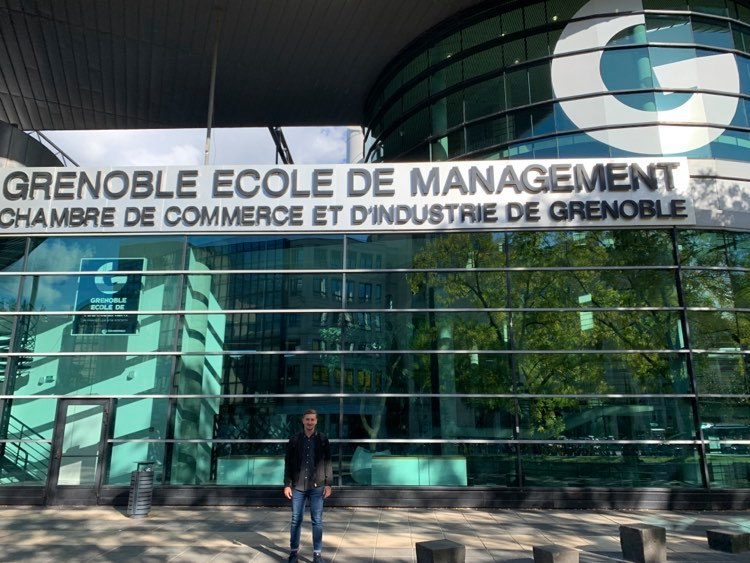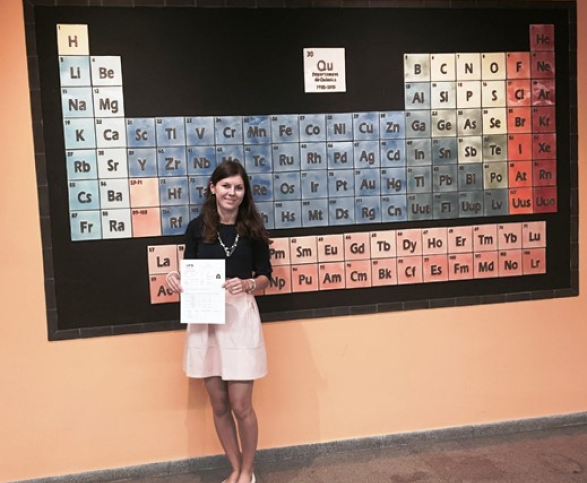
Arkadiusz Liszka, a Maspex Foundation scholar who studied at Grenoble Ecole de Management in France during the academic year 2021/22, answers questions about his application, his studies, and what he is doing today.
Why did you decide to study abroad?
I decided to study abroad right after attending the Maspex Foundation workshops. The session was very inspiring; I realized it was an opportunity not to be missed. The first reason is the quality of education. I wanted to ensure that I was acquiring knowledge at the highest level, so choosing a foreign university seemed attractive to me. I had heard many positive opinions about study programs and the quality of lecturers at various foreign universities, which inspired me to make this decision.
Another important reason was the international experience. I have always been interested in cultural and linguistic diversity, so studying abroad gave me the opportunity to explore new cultures and connect with people from all over the world. I knew that this experience would help me develop intercultural dialogue skills and open new perspectives in both my personal and professional life. I wanted to learn about other perspectives, opinions, and ways of working to make them my asset in the future.
Another factor that influenced my decision was the prospect of obtaining an international degree. I believe that having a degree from a renowned foreign university opens many doors in the job market. This is important, especially in today’s competitive professional environment, where employers often value international experience and education.
Additionally, studying abroad was an opportunity for self-development and gaining new life skills. I had to learn independence, problem-solving, and adapting to a new environment. This experience certainly made me more independent and confident. Since graduating, I have lived in three different cities in two countries, allowing me to better discover myself and appreciate Poland and what it offers. I know that in the future, I will want to return equipped with the right knowledge and skills.
It is also worth mentioning that my decision to study abroad was related to my personal ambitions and career goals. I wanted the opportunity to learn from the best specialists in my field and gain knowledge that would enable me to succeed in my future career.
In summary, choosing to study abroad was a decision based on the pursuit of quality education, the desire for international experience, obtaining an international degree, and personal development. This experience allowed me to grow as a student and as a person, opening many new opportunities and perspectives for me.
What were the biggest challenges you faced while studying abroad?
When I decided to study abroad, I encountered quite a few challenges that were difficult but also exciting. At the beginning, I had to adapt to a new environment and customs, which was not always easy. Cultural differences can sometimes surprise you, but I learned to respect differences and try to understand other people.
Another major problem was the language barrier. I speak English fluently, but I am not a native speaker, so I had to work hard on my accent and vocabulary. There is probably no better language school than the necessity of using the language in the most unexpected situations.
Being separated from family and friends was also tough. You have to accept the fact that everyone around you will change, along with yourself, and at some point, your circle of friends might change significantly. I try to fly to Poland as often as possible because you can never forget about your closest people, and I want to spend as much available time with them as possible.
Another challenge was the costs. Studying abroad can be very expensive, so you need to plan your budget well and spend money wisely. The Foundation practically minimized this problem to zero, for which I am immensely grateful.
The education system was also different from Poland’s. Different teaching methods and grading systems required adaptation. These differences were generally positive, with more hands-on work, group projects, and much less work with books or abstract mathematical tasks.
Then there were the living arrangements. Initially, I had to find an apartment, handle all the necessary documents, and sort out health care. This was also a challenge, but eventually, it worked out – it’s part of the process of becoming independent, which is incredibly important.
And lastly, the academic pressure. Studying abroad adds an extra level of pressure. Lecturers expect a lot, and the competition is tough. Every person in the course has been selected by the university’s admissions office, raising the class’s overall level; everyone strives to be the best – in a positive sense. You need to be able to handle stress and focus on learning. However, studying abroad allows you to choose a course that fully meets your expectations, and in my case, marketing turned out to be a perfect fit, which made taking on new challenges with a smile.
What were the biggest advantages of studying abroad?
First of all, getting to know new cultures and people is absolutely invaluable. Studying in a foreign country gave me the chance to immerse myself in a completely different cultural environment. I met people from different parts of the world, which broadened my horizons and opened my eyes to diversity and differences between cultures.
Secondly, studying abroad allowed me to improve my language skills. I am not just talking about English because, while studying in France, I picked up a bit of French, and I am currently learning Italian. It is an ideal time to learn a third language, which is slowly becoming a European standard.
Another advantage is the degree from a renowned foreign university. By choosing this university, I had access to lecturers and academic resources that were not only of high quality but also world-class. This helped me grow intellectually and gain knowledge in a field that fascinated me. Most lecturers have extensive practical experience and impressive CVs. Students are not treated as people who know nothing, but rather as individuals discovering certain topics and adding a completely new, significant perspective.
Living abroad gave me the opportunity to travel and explore completely new places. France, where I studied, was an excellent starting point for traveling around the continent. France, Spain, Italy, and the Netherlands are just a few countries that I managed to explore to varying degrees.
Studying abroad taught me independence and self-reliance. I had to handle daily matters such as shopping, cooking, and managing finances, which helped me build a solid foundation for adult life. Being far from family and friends pushed me to develop my self-awareness and decision-making abilities.
Employers often appreciate people who had the courage and determination to study in another country. It demonstrates flexibility, adaptability, and the ability to handle various situations. In my case, it allowed me to complete an internship at a renowned French company and currently work at one of the largest marketing agencies, working for the biggest brands in the world, despite not having extensive experience in marketing.
In summary, studying abroad is not only an opportunity to gain an education but also to develop personally and culturally. This experience opens doors to new opportunities, teaches patience and independence, and, above all, allows for creating unforgettable memories and friendships worldwide. For me, it was extraordinary, and I definitely recommend anyone considering studying abroad to try this experience.
What was the application and admission process like for a foreign university?
**Step 1: Choosing a university and program**
The first and crucial step is choosing the right university and study program. This decision will impact your future, so it’s worth spending time to understand what a given university offers and whether it aligns with your goals and interests. I recommend starting your search as early as possible, sometimes even two years before the planned start date, by familiarizing yourself with the global or European rankings of universities and programs and choosing the right country.
**Step 2: Preparing documents**
After making your choice, you need to start preparing your application documents. Depending on the university and program, these may include previous study diplomas, language test results (e.g., TOEFL, IELTS), CV, reference letters, and a motivation letter, and sometimes GMAT. Make sure to meet the university’s requirements for documents precisely. I spent ages searching the university websites to ensure I met all the requirements. Universities often offer online workshops where they explain the entire process in detail. Recommendations from work or university are also important. Therefore, I recommend everyone preparing for studies abroad to seize every opportunity, such as student associations, conferences, interest clubs, and gaining work experience. This will allow you to collect more documents and increase your chances of getting into the chosen course.
**Step 3: Submitting the application**
When preparing to submit your application, check carefully how the university accepts application documents. At Grenoble Ecole de Management, applications are usually submitted online through specially available application platforms. I was also in contact with a university representative who reached out to me while I was uploading documents to the system to offer assistance.
**Step 4: Interview and Personal Statement**
Some programs may require candidates to undergo an interview. This is an opportunity to showcase your motivations and skills. You also need to write a “Personal Statement,” which is essentially an essay about your educational and professional career and experiences. Each university has different requirements; this is, however, a very important stage.
**Step 5: Waiting for the decision**
After submitting the application, you have to wait for the university’s decision. This was a very stressful time, but it ended very pleasantly. The waiting time can vary depending on the university but usually ranges from a few weeks to a few months.
What were the differences between the education system abroad and that in Poland?
Master’s studies in France differ from those in Poland in many respects. They last two years, but only the first year is spent at the university. The second year is dedicated to completing an internship and writing a master’s thesis, often supervised by a mentor who may be located in another part of the world, meaning cooperation is mostly online. Additionally, in France, you need to choose your specialization at the bachelor’s level, while in Poland, this decision often comes at the master’s level, giving students more time to consider their career path.
The grading system is also different. In France, grades range from 0 to 20, and you pass by obtaining at least 10
points, which is 50%. In Poland, the pass threshold is usually 30%. The assessment process is not limited to a final test and includes various criteria such as independent work, group projects, workshops, and tests. A lot of time is devoted to presentations and group work, reflecting the way many companies operate.
Students in France are encouraged to work independently. There are fewer theoretical classes and more practical learning based on real-world examples from various industries, from technology to fashion. At the end of a course, students receive detailed feedback from the instructor regarding their performance, strengths, and areas for improvement. Students also evaluate the lecturers, which helps improve teaching quality.
Another difference is the possibility of choosing subjects, although this depends on the specific university. At French universities, there are also many courses focused on developing soft skills such as presentations, negotiations, or CV writing, which are invaluable in later professional life.
How did your career path go? What do you do today?
My studies allowed me to better understand myself and clarify what I want to do in the coming years. Initially, I only had a general idea about my future career, dreaming of working in marketing but not being sure in which exact field. I was aware of the job market’s expectations and the requirements placed on me. At the university, I used the Career Center’s help to prepare my CV and plan my career to find my dream internship. Due to strong competition, I sent out numerous applications and went through many interviews before finding a place where I spent the next six months. The interviews were very specific, with expectations of real-life examples. The experience gained in my course, where we had the opportunity to work on projects for external companies from various industries, was very helpful. For me, valuable experiences included creating a new business model for one of the companies and restructuring the website for a popular portal offering cottage rentals in the French Alps. The time spent on an internship in Paris was also a valuable and fascinating experience that I will remember for a long time. Moving from Grenoble to Paris to work in the marketing department of a large cosmetics company was an important step in my career. However, it required a certificate of studying at a renowned foreign university. Later, I decided to make another change – moving to Amsterdam, where I currently work for a media house. Our client is Nike, which allows me to work on planning and executing marketing campaigns ranging from sportswear and lifestyle to projects related to corporate social responsibility and supporting cultural minorities in the European market. However, over time, I am considering the next stage in my career, possibly in another country.
It is definitely worth considering getting involved in various student organizations or even taking on part-time work. This will enrich your application and make it stand out from many others. It is also important to dedicate yourself to studying at the university – good grades have a significant impact on the application process. It is also worth finding out early what truly interests you and what you want to study abroad, not necessarily related to the field of your previous studies. I am an example of this – I completed engineering studies at AGH, and in France, I studied marketing. I recommend watching YouTube videos where different people share their experiences of studying abroad. You can find materials about practically any well-known university or city. Regularly following rankings and looking for opinions about universities can also be helpful. Choosing the right country to study in can facilitate finding a job after graduation and avoid the need to move. In some countries, it is easier to find a job knowing only English, although it all depends on the individual situation. In my case, I managed to stay in France despite not being fluent in French.
After moving abroad, it is worth being open to new experiences and courageous. Meeting new people and cultures can be fascinating. Be ready to adapt and open to differences. Studying in a foreign country can be challenging, so don’t hesitate to ask for support when needed. Universities usually have support systems for international students, which are worth utilizing. At prestigious foreign universities, students are treated more like future employees and team members than like pupils, at least in my experience. Building relationships is also important. Creating strong bonds with other students and lecturers is crucial. Practically at every major company where I applied, I could find someone who studied at the same university as me, which could facilitate the initial contact or make the recruiter pay attention to my CV. Every student is in a similar situation – everyone is looking for new friends, learning new things, and trying to survive at the university. Be curious about the world as well. The university is a place to deepen knowledge in areas where we want to work, which is extremely important for career planning. At the same time, take advantage of travel opportunities, try new dishes, and learn the local language. All of this can make your experience abroad even more unforgettable and broaden your horizons. I wish you good luck!


